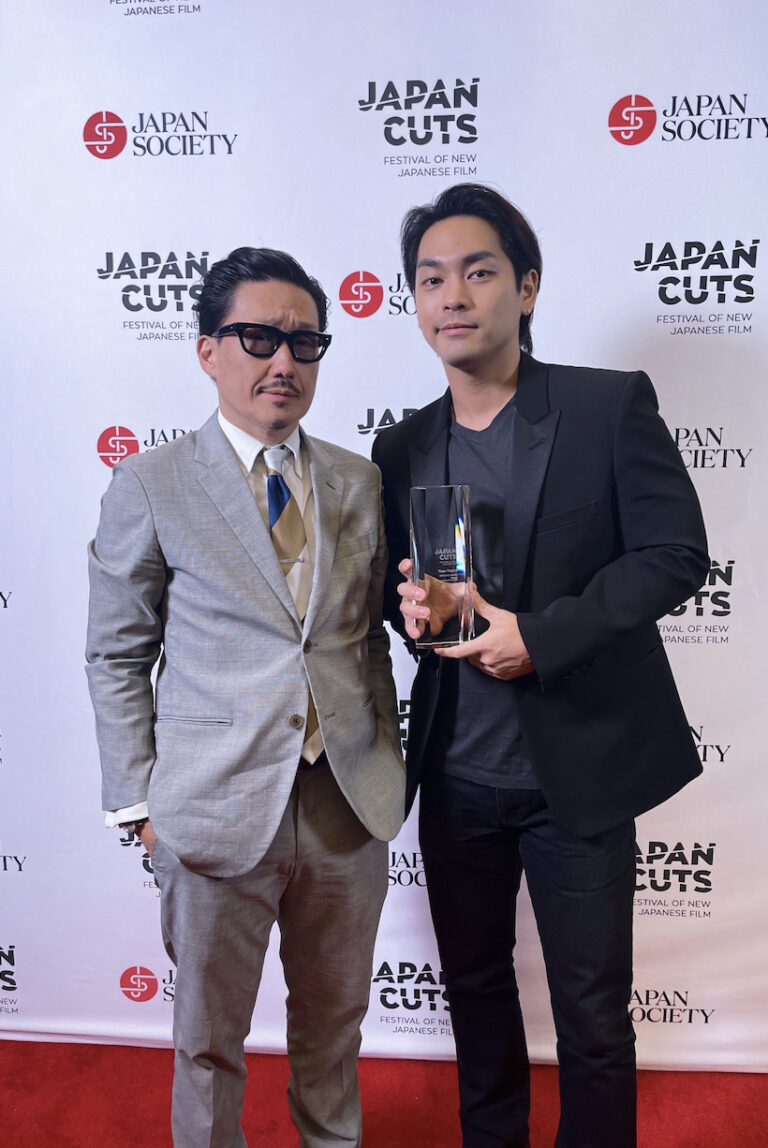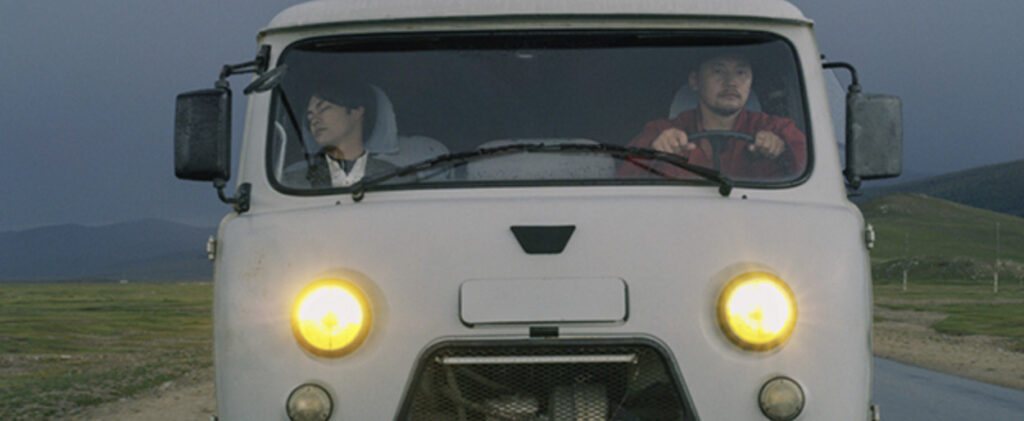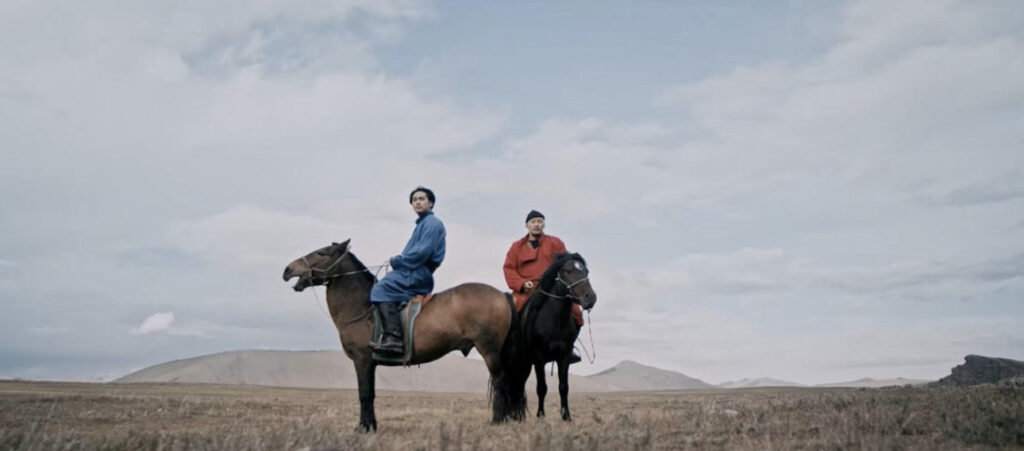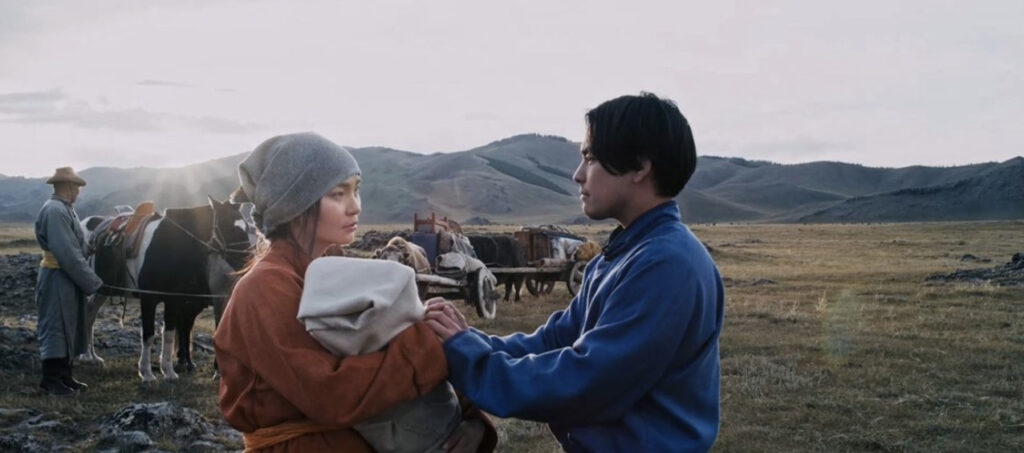
@Japan Society
Synopsis : An international co-production bringing together a Japanese, Mongolian, French, Australian and Chilean team, Under the Turquoise Sky from director KENTARO follows the spoiled Takeshi (played by Japanese star Yuya Yagira) who is sent out to the Mongolian countryside by his wealthy grandfather (legendary actor and Butoh master Akaji Maro). Together with his Mongolian guide (Mongolian leading man Amra Baljinnyam), Takeshi’s travels lead to stunning vistas, profound mysteries and personal growth. A lush road movie with touches of the surreal, Under the Turquoise Sky casts a spell with humblingly beautiful directing, acting and cinematography.
Dir. KENTARO, 2021, 95 min., DCP, color, in Japanese and Mongolian with English subtitles. With Yuya Yagira, Amra Baljinnyam, Akaji Maro.
Exclusive Interview with Actor Yuya Yagira and KENTARO (The Interview was conducted on August 5th)
Q: “Under the Turquoise Sky” is a co-production between Japan, Mongolia and France. How did you start the project and go about making it?
KENTARO : It started in Mongolia, between me and Amarsaikhan Baljinnyam, a top Mongolian star and his company. He wanted to make a project in Japan, so I wrote a script in a filmmaking format and brought it to Japan. So the script was written in Mongolia.
Q: How much of the script was already developed and how much was improvised on the set?
Kentaro: As far as the storyline goes, very little of it was written after the script was completed. Originally, I had the entire storyline in mind, which had already been decided. While in Mongolia, I decided on the scenes to be filmed, but there were times when the dialogue was undecided. Once I saw the energy of each actor, I then decided on set [what it would be done] in some places of the script.
Q: I heard that Amarsaikhan Baljinnyam, who played Amra, the guide for Takeshi, is a superstar in Mongolia and has appeared in Hollywood movies as well. What kind of synergy did he add to this film while you were shooting in Mongolia? What was the most memorable moment of filming with him?
Yuya Yagira : It might be rude to say, but I didn’t expect Mongolian actors to be of such a high level. I didn’t know them at all before I was there. I was also surprised to learn that Ms. Tsetsegee Byamba, who played the role of a pregnant nomadic woman, had won an award at the Asian First Film Festival before and had been to the Venice International Film Festival [with her film]. She had participated in quite a few international productions as well. I liked the communication without dialogue depicted in the film, because I like to perform without much dialogue. There were many good actors in total, and I’m glad I decided to come here.
(C)TURQUOISE SKY FILM PARTNERS / IFI PRODUCTION / KTRFILMS
Q: Is there a proper film company in Mongolia?
KENTARO : When we shot this film, there was no film commission, but since then, a film company has been established, and there is now a film commission. It has been influential at the Cannes Film Festival. This film was shot in a place where we had nothing, but the actor Ganzorig Tsetsgee, who played the role of police officer, is really a top comedic actor in Mongolia, and he helped us out a lot. He helped a lot, especially when we went to different places, he could get permission to shoot within 10 minutes. So, in that sense, it was a real honor to be able to film local people in a really local places and do it in such an authentic way.
Q: In the local area, you encounter nomads who live by moving around the grasslands with their livestock, and people who leads a gel [a mobile home] life. What did you learn from them and what aspects of their lives did you empathize? Did it instill a new awareness in you?
Yuya Yagira : There are quite a lot. What I think was important was that, apart from material wealth, I also learned to grow spiritually. This is true not only for me, but for everyone involved in this project. I also learned that we’re not perfect, that we’re always learning. I began to think about various cultural aspects of Mongolia. I realized that it’s precisely because there is nothing in Mongolia as far as materials go, such that I could feel something in nature [instead].
Q: I heard that you filmed on location in Mongolia for about three and a half weeks and while you were living in Mongolia you lived in such a way that you were cut off from the cultural life in Japan, which you had taken for granted. What do you think is the appeal of living in Mongolia? There is a world with completely different cultural values from Japan. What was the appeal of Mongolia?
Yuya Yagira : I don’t know if it was because I was with Amarsaikhan Baljinnyam, but basically I felt that people in Mongolia love their own culture and what they have in their country very much. I was able to look at Japan objectively again after visiting such places in Mongolia. I wondered to what extent I can have a better grasp of my own country when I am out there rather than when I am living in Japan. I wonder if I can talk well about Japan to foreigners when I come overseas. I felt that the Mongolian people] are independent in that way.
KENTARO : When we went over there [to Mongolia], the people weren’t Japanese. In that sense, I felt culture shock similar to Takeshi’s role in this film, but I didn’t let Yagira prepare anything in advance. That’s one of his strong suits — that he is an actor with such an adventurous spirit. Mongolia is not a Confucian country. Other countries such as China, Korea, Vietnam, and Thailand have roots in Confucianism in common, so they offers something in common for them as Asians. I don’t feel that in Mongolia. Although they’re Asian, they’ve been influenced by Russia and the former Soviet Union for a long time. They have a truly unique culture and are part of a unique country. It’s an experience that can’t be summed up by the word “exotic.”

(C)TURQUOISE SKY FILM PARTNERS / IFI PRODUCTION / KTRFILMS
Q: This film reminds me of the Finnish director Aki Kaurismäki’s road movies. The improvisational part of the film has elements of the French Nouvelle Vague. You also shot this film in 8K. How did you prepare for the filming and communicate your intentions to the crew before you started shooting?
KENTARO : This is a very unusual approach. I had known a cinematographer named Ivan Kovac [“Equals,” “Kumiko, the Treasure Hunter”] for a while who could shoot in an improvisational way, and we decided to work with him to create something beautiful. The camera he had access to happened to be an 8K one. So we decided to make a beautiful film like “Lawrence of Arabia,” — that’s how it all started. Then, some time passed, and we experimented a lot for the shoot.
We decided to use Laika lenses from the ‘80s, because we had done that before. It was like putting analog lenses on a digital camera, and we changed the lens kit again, and it offered a very particular image that we were going for. It’s very rare. We did it while looking for [the right visual effect], so we had a flexible approach to everything, like, “We have this, so we’re going to use it.” Ivan, the cinematographer, is very flexible, and he and the actors all have a kind of animalistic sense. All cinematographers I like have that attitude.
I like Jean-Luc Godard’s cinematographer Raoul Coutard the best, and there are surprisingly few cinematographers who can do something like he does. I can also shoot with a camera, so I wanted to make something dynamic, beautiful, and cool, while also making it realistic.
Q: This film is probably the first time you’ve shot on location overseas since “Hoshi ni natta shônen /The Boy Who Became a Star,” but back then it was after the film “Nobody Knows” while you were still in your mid-teens. Compared to those days, how much has changed from before, while you’re still filming on location overseas?
Yuya Yagira : Actually, the story of the road movie overlapped with Takeshi’s feelings. I could understand it, even without thinking about my career or anything like that. I still wanted to grow more. I was thinking that I wanted to have more of an education and be stronger in order to become a global actor in my 30s. That idea itself was totally different from doing the movie, “Hoshi ni natty shônen/The Boy Who Became a Star,” when I was only 14 years old.
Meeting KENTARO-san was like meeting the main character Takeshi and Amra; there was no one around me who was Japanese, had been to five different countries, controlled his own language, and was in a leadership position like Kentaro. In the past, I had participated in overseas location shoots with a Japanese crew and had the momentum to go for it, but this time was a different pattern, and I felt comfortable there. It was a new style to have a Japanese person as the leader and to have myself as the main character in a situation where everything was well organized. I had a lot of inspiration from that, so I didn’t really think of myself as much.
Q:I heard that there were not only Japanese but also Mongolians, Australians, and Chileans among the film crew. What were your concerns in bringing them together?
KENTARO : I wanted to get people that I was comfortable with. There are core members of my team, cinematographer, scriptwriter, and sound man. In extreme cases, those are the people that I would put my life on the line for. That’s why I gathered the people that I was comfortable with, even though they spoke Spanish and French. With that as a core, I went to Mongolia and worked 100% with Mongolian staff and assistants just as when I went to Japan, and worked 100% with Japanese staff and assistants. In that sense, you have to be flexible, you have to be a very curious actor and be able to see the whole film well.
I think that’s an excellent element of the film. Usually, when a Japanese international production goes to some foreign country, all the members of the entire team are Japanese. They go to a foreign country, but eat bento every day, and shoot in a foreign country but with the Japanese system, so I think it’s natural that the local authenticity does not come through. It’s the same in America as well. I won’t mention the title, but when you film a story about Geishas or something like that, something is off when the story is written by an American. I wanted to make a film that could be seen by Mongolian viewers.

(C)TURQUOISE SKY FILM PARTNERS / IFI PRODUCTION / KTRFILMS
Q: In recent years, you’ve appeared in such high-profile films as “Hokusai,” “Gift of Fire,” and “Asakusa Kid.” Do you have some kind of non-negotiable criteria for selecting those films, given that you have such acting experience and are in a position to choose films now?
Yuya Yagira : When I was in my 20s, I was able to do a variety of works based on the criterion of not being too particular about what I wanted to do. But in the process, I have come to understand my identity, what I am suited for, and how I am not so motivated by this type of work or that and so on. In my teens, I had a lot of good fortune, so in my 30s, I’d like to combine that with other things, and participate in things that I can focus on or show my strength in.
Q: This film will be screened at the Japan Society’s Japan Cuts, and will be seen not only by Japanese but also by American audiences. What do you want Americans to see through this film?
KENTARO : Simply put, I would be happy if the film conveys universal themes in life. After all, life is complicated, with sadness, happiness, fun, and joking around all part of the experience. If this could be conveyed in a universal way — and the word “universal” is very important, because it is so difficult to use.
Yuya Yagira : There was the initial screening and the audience’s reaction was very positive; and Kentaro’s talk was very exciting. I have no idea how American audiences will see the film. I don’t know what kind of audience they are, so I would like to see their reactions and get an impression of how they think about it.

(C)TURQUOISE SKY FILM PARTNERS / IFI PRODUCTION / KTRFILMS
Check out more of Nobuhiro’s articles.
Here’s the trailer of the film.

